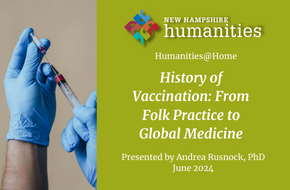A History of Vaccination: From Folk Practice to Global Medicine
Virtual

Vaccination is roughly 200 years old and it has dramatically reduced infectious disease. Global vaccination campaigns have eradicated smallpox and decreased polio incidence by 99%. These remarkable achievements have reduced the number of deaths and prevented lifelong disabilities such as blindness and paralysis. Today we routinely vaccinate infants and children to protect them from many life-threatening and disabling diseases. But ever since Edward Jenner vaccinated eight-year-old James Phipps with cowpox in 1796, vaccines have provoked profound scientific questions about what they are, how they work, and whether they are safe. More broadly, we continue to wrestle with ethical and religious issues that stem from the very principle of vaccination, to create an immune response to prevent future infection. This talk will explore the history of vaccines, the emergence of vaccination protocols and policies, and changing public opinion about vaccines and vaccination, up to and including our current debates.
Presented by Andrea Rusnock, PhD, a historian of science and medicine and a professor of history at the University of Rhode Island. She has written extensively on the early history of smallpox inoculation and vaccination and is the author of two books and over thirty journal articles, book chapters, and book reviews.
Please RSVP for this virtual Humanities@Home program below.